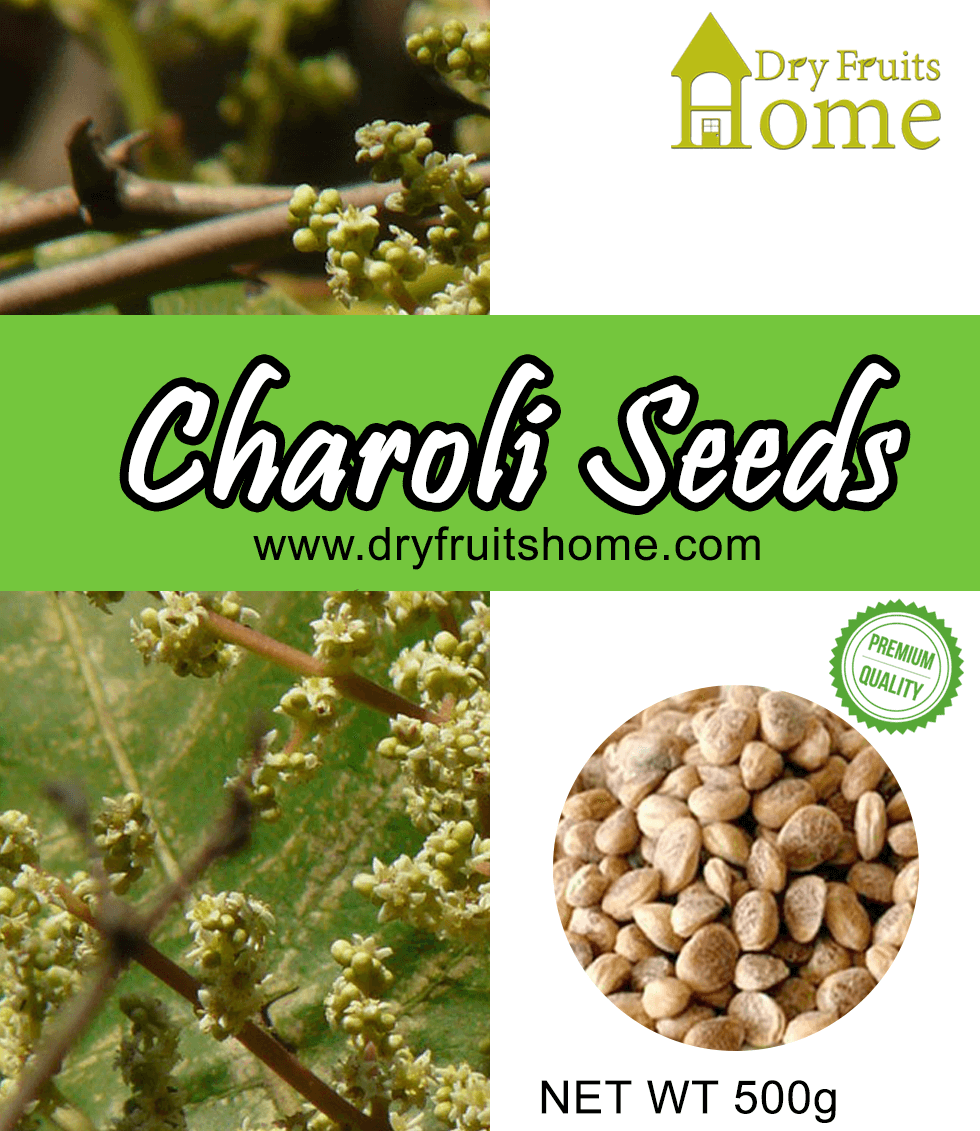Description
Charoli seeds, also known as chironji or chiroli seeds, are small, almond-shaped seeds harvested from the fruit of the Buchanania lanzan tree, which is native to India. These seeds are highly regarded in Indian cuisine and traditional medicine for their unique flavor and numerous health benefits. In this extensive article, we will explore charoli seeds in great detail, covering their botanical characteristics, cultivation, nutritional composition, culinary uses, health benefits, and much more.
Table of Contents:
- Introduction to Charoli Seeds
- Definition and Overview
- Historical Significance
- Botanical Characteristics and Cultivation
- Buchanania lanzan Tree
- Cultivation Practices
- Harvesting Charoli Seeds
- Nutritional Composition
- Macronutrients
- Micronutrients
- Antioxidants
- Culinary Uses
- Traditional Indian Dishes
- Desserts and Sweets
- Flavoring Agents
- Charoli Oil
- Health Benefits
- Heart Health
- Weight Management
- Digestive Health
- Skin and Hair Benefits
- Antioxidant Properties
- Ayurvedic and Medicinal Uses
- Traditional Ayurvedic Medicine
- Potential Health Remedies
- Precautions and Considerations
- Allergies
- Moderation
- Medicinal Use
- Conclusion
- Versatile and Nutrient-Rich
- Incorporating Charoli Seeds into Your Diet
1. Introduction to Charoli Seeds:
Definition and Overview: Charoli seeds, scientifically known as Buchanania lanzan, are the edible seeds extracted from the fruit of the charoli tree. These seeds are small, almond-shaped, and ivory or light brown in color. Charoli seeds have a mild, nutty flavor and are widely used in Indian cooking, particularly in desserts and savory dishes. They are a prized ingredient in Indian cuisine and are valued for their culinary versatility and nutritional benefits.
Historical Significance: Charoli seeds have a long history of use in Indian cuisine and traditional medicine systems like Ayurveda. They have been incorporated into various regional dishes and are often used to add a unique texture and flavor to sweets, snacks, and curries. Charoli seeds have been treasured for their potential health benefits and are considered a valuable addition to a balanced diet.
2. Botanical Characteristics and Cultivation:
Buchanania lanzan Tree: Charoli seeds are derived from the fruit of the Buchanania lanzan tree, which is native to India and other parts of South Asia. This tree is also known by various regional names, including chironji tree, charoli tree, and almondette tree. It is a deciduous tree that can reach heights of up to 20 meters. The tree produces small, greenish-yellow, edible fruits that encase the charoli seeds.
Cultivation Practices: Charoli trees thrive in tropical and subtropical climates. They require well-drained soil and are typically grown from seeds or seedlings. The tree takes several years to mature and produce fruit. Once the fruits ripen, they are collected, and the charoli seeds are extracted from the hard shell.
Harvesting Charoli Seeds: Harvesting charoli seeds involves removing the fruits from the tree when they are fully mature. The fruits are then dried in the sun to facilitate the extraction of the seeds. Once the fruits are sufficiently dried, the seeds are removed by cracking the hard shell. These seeds are then cleaned and sorted before being distributed for culinary or medicinal use.
3. Nutritional Composition:
Macronutrients: Charoli seeds are rich in macronutrients, particularly healthy fats and protein. They contain approximately 47-55% fat and 17-25% protein. The fats in charoli seeds are primarily unsaturated fats, including monounsaturated and polyunsaturated fats.
Micronutrients: Charoli seeds are a good source of essential vitamins and minerals. They contain significant amounts of minerals like calcium, phosphorus, potassium, and magnesium. These minerals are essential for bone health, muscle function, and overall well-being.
Antioxidants: Charoli seeds are known for their antioxidant properties. They contain antioxidants like flavonoids and polyphenols, which help protect the body’s cells from oxidative damage caused by free radicals. These antioxidants may contribute to the health benefits of charoli seeds.
4. Culinary Uses:
Traditional Indian Dishes: Charoli seeds are a staple in Indian cuisine, particularly in the northern and western regions of the country. They are often used as a garnish in various dishes, including curries, rice dishes, and vegetable preparations. Charoli seeds add a delightful crunch and nutty flavor to these dishes.
Desserts and Sweets: Charoli seeds are a popular ingredient in Indian sweets and desserts. They are used to enhance the flavor and texture of dishes like barfi (a sweet confection), kheer (rice pudding), and various types of halwa (a sweet dish made from grains or legumes). Charoli seeds are sometimes used to garnish sweet dishes as well.
Flavoring Agents: Charoli seeds are also used to make a paste, which is used as a thickening and flavoring agent in Indian gravies and sauces. The paste imparts a creamy texture and a mild, nutty taste to the dishes.
Charoli Oil: Charoli seeds can be cold-pressed to extract charoli oil. This oil is used in cooking and is also applied topically for skin and hair benefits. Charoli oil has a nutty aroma and can enhance the flavor of various dishes.
5. Health Benefits:
Heart Health: Charoli seeds contain healthy unsaturated fats, including monounsaturated and polyunsaturated fats. These fats are known to be heart-healthy and can help reduce the risk of heart disease when consumed as part of a balanced diet.
Weight Management: The protein and healthy fats in charoli seeds can contribute to a feeling of fullness and satiety. Including charoli seeds in your diet may help control appetite and reduce overall calorie intake, potentially supporting weight management efforts.
Digestive Health: Charoli seeds are a good source of dietary fiber, which aids in digestion and promotes regular bowel movements. Fiber helps prevent constipation and supports a healthy digestive system.
Skin and Hair Benefits: Charoli seeds are traditionally used in India for skincare and haircare. The oil extracted from charoli seeds is applied topically to moisturize and nourish the skin and hair. It is believed to promote healthy, radiant skin and may help reduce skin dryness.
Antioxidant Properties: The antioxidants present in charoli seeds, such as flavonoids and polyphenols, help protect the body’s cells from oxidative stress and damage caused by free radicals. Antioxidants are associated with various health benefits, including a reduced risk of chronic diseases.
6. Ayurvedic and Medicinal Uses:
Traditional Ayurvedic Medicine: Charoli seeds have a long history of use in Ayurvedic medicine, where they are valued for their potential health benefits. They are considered to have cooling properties and are used in Ayurveda to balance pitta dosha, one of the three fundamental energies in the body.
Potential Health Remedies: In traditional medicine, charoli seeds have been used for various health remedies. They are believed to have diuretic properties and may be used to promote urination. Charoli seeds are also used as a natural remedy for diarrhea and dysentery in some traditional systems of medicine.
7. Precautions and Considerations:
Allergies: While charoli seeds are generally safe for consumption, individuals with nut allergies should exercise caution, as some people with nut allergies may also react to charoli seeds. Allergic reactions to charoli seeds can include itching, hives, or digestive discomfort. If you suspect an allergy, seek medical advice.
Moderation: Like many seeds and nuts, charoli seeds are calorie-dense due to their fat content. While they offer health benefits, it’s important to consume them in moderation, especially if you are watching your calorie intake.
Medicinal Use: If you are considering using charoli seeds for medicinal purposes, it’s advisable to consult with a healthcare professional or an Ayurvedic practitioner. They can provide guidance on appropriate dosages and potential interactions with other medications or health conditions.
8. Conclusion:
In conclusion, charoli seeds, derived from the fruit of the Buchanania lanzan tree, are a valuable ingredient in Indian cuisine and traditional medicine. They are known for their unique flavor, nutritional richness, and potential health benefits. Whether used in savory dishes, sweets, or skincare routines, charoli seeds offer a range of culinary and wellness advantages. When incorporated into a balanced diet and used in accordance with traditional practices, charoli seeds can contribute to overall well-being and enhance the culinary experience.





Kajal (verified owner) –
Discounts for repeat customers are a nice touch.
Shruti (verified owner) –
The freshness seal on the packaging instills confidence in the product’s quality.
Rohan (verified owner) –
The option to reorder from previous purchases is a time-saver.
Anika (verified owner) –
Email newsletters are informative, keeping me updated on new arrivals and promotions.
Akash (verified owner) –
The inclusion of a customer satisfaction survey in the packaging shows a commitment to improvement.
Sanya (verified owner) –
The online store’s loading speed is impressive, allowing for efficient browsing.
Vishnu (verified owner) –
The inclusion of a customer satisfaction survey in the packaging shows a commitment to improvement.
Anjum (verified owner) –
The option to create a wishlist for future purchases is practical.